If you’ve been looking into purchasing a new keyboard, you’ve most likely been familiar with the phrases “mechanical keyboard” and “regular keyboard.” Both of these types of keyboards have their advantages and disadvantages. However, what precisely differentiates these two kinds of keyboards from one another?

What does CNC mean in keyboards?
In the context of keyboards, CNC stands for Computer Numerical Control. CNC refers to the manufacturing process used to create keyboard cases or other components. It involves the use of computer-controlled machines to precisely cut and shape materials such as metal, plastic, or wood according to a pre-programmed design. CNC machining allows for highly accurate and repeatable production of keyboard parts. It can create intricate designs and precise details that may be challenging or impossible to achieve with traditional manufacturing methods. CNC-machined keyboard cases often have a high-quality finish and can be customized to meet specific design requirements. Many premium and custom keyboards feature CNC-machined cases due to their durability, precise fit, and aesthetic appeal. The term “CNC” in the context of keyboards generally signifies that the keyboard’s case or components have been manufactured using this computer-controlled machining process.
Why is a CNC aluminum keyboard better than a normal one?
A CNC aluminum keyboard is often considered better than a “normal” one for several reasons:
1. Durability
Aluminum is a robust and sturdy material. CNC machining allows for precise shaping and cutting of the aluminum, resulting in a strong and durable keyboard case. It can withstand heavy use and is less prone to flexing or bending compared to keyboards made from cheaper or less rigid materials.
2. Premium Look and Feel
Aluminum keyboards have a sleek and premium appearance. The CNC machining process enables the creation of precise designs and intricate details that enhance the overall aesthetic appeal. The aluminum’s smooth and solid texture adds to the tactile experience, giving the keyboard a high-quality look and feel.
3. Improved Typing Experience
The rigidity of an aluminum keyboard contributes to a more stable typing platform. It minimizes flex or wobbles during typing, allowing for more accurate and comfortable keystrokes. This can be particularly beneficial for those who type for extended periods or require precise input, such as gamers or professionals.
4. Customizability
CNC machining allows for intricate customization options. The precise nature of the process enables the inclusion of unique designs, patterns, or engraving on the keyboard case. Additionally, aluminum can be anodized in various colors, offering a wide range of customization possibilities.
5. Heat Dissipation
Aluminum has excellent thermal conductivity, meaning it can effectively dissipate heat generated by the keyboard’s components, particularly in the case of mechanical keyboards with backlit keys or high-performance switches. This helps prevent overheating and maintains optimal performance during prolonged use.
It’s important to note that the term “normal” keyboard is subjective, and different people may have different preferences. While CNC aluminum keyboards offer certain advantages, they may also come at a higher price point compared to keyboards made from other materials. Ultimately, the choice of keyboard material depends on individual preferences, budget, and specific requirements.
What is the difference between a CNC aluminum keyboard and a normal one?
Certainly! Here are some more specific differences between a CNC aluminum keyboard and a “normal” keyboard:
1. Material
The primary distinction lies in the material used for the keyboard case. CNC aluminum keyboards are made from solid blocks of aluminum that are precisely machined using computer-controlled processes. In contrast, “normal” keyboards often use plastic or a combination of plastic and metal for their construction. Aluminum provides superior durability, rigidity, and a premium look and feel compared to many plastic keyboards.
2. Manufacturing Process
CNC aluminum keyboards are manufactured through the CNC machining process. This involves the use of computer-controlled machines to cut, shape, and mill the aluminum material to precise specifications. On the other hand, “normal” keyboards typically use injection molding or other mass-production techniques, where the materials are melted and injected into molds to form the keyboard components.
3. Precision and Detail
CNC machining enables high precision and intricate detailing in aluminum keyboards. The computer-controlled machines can create complex designs, custom engravings, and precise cuts that may not be achievable through other manufacturing methods. This level of precision results in a more refined and visually appealing product compared to the typically simpler designs of “normal” keyboards.
4. Sturdiness and Flexibility
Aluminum keyboards, due to the nature of the material, offer greater rigidity and stability compared to many plastic keyboards. They are less prone to flexing or bending, providing a more solid typing platform. This can enhance typing accuracy and reduce fatigue, particularly during prolonged or intense typing sessions. Plastic keyboards may exhibit more flexibility or wobble, which can affect the typing experience.
5. Heat Dissipation
Aluminum has excellent thermal conductivity, allowing it to efficiently dissipate heat. In the case of mechanical keyboards with backlit keys or high-performance switches that generate heat during operation, aluminum keyboards can help in dissipating heat and maintaining optimal performance. Plastic keyboards generally have lower thermal conductivity, making them less effective at heat dissipation.
6. Weight
CNC aluminum keyboards tend to be heavier than plastic keyboards. The solid aluminum construction adds weight to the keyboard, providing stability and a substantial feel. Some people prefer the added heft as it can reduce keyboard movement during use, while others may prefer lighter keyboards for portability reasons.
It’s important to note that these differences are not absolute, and there can be variations in the design, construction, and materials used in both CNC aluminum keyboards and “normal” keyboards. The choice between the two ultimately depends on personal preferences, budget, and specific requirements such as durability, aesthetics, or typing experience.